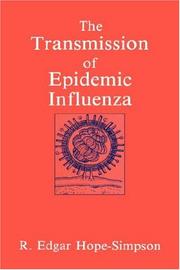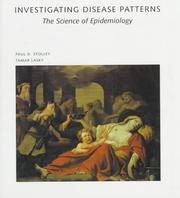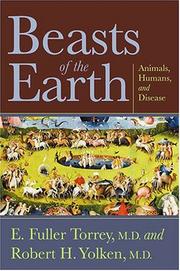| Listing 1 - 10 of 28 | << page >> |
Sort by
|
Book
ISBN: 0323900011 0323856624 9780323900010 9780323856621 Year: 2021 Publisher: London, England : Academic Press,
Abstract | Keywords | Export | Availability | Bookmark
 Loading...
Loading...Choose an application
- Reference Manager
- EndNote
- RefWorks (Direct export to RefWorks)
"In the past two decades, several pandemics have ravaged the globe, giving us several lessons on infectious disease epidemiology, the importance of initial detection and characterization of outbreak viruses, the importance of viral epidemic prevention steps, and the importance of modern vaccines. Pandemic Outbreaks in the Twenty-First Century: Epidemiology, Pathogenesis, Prevention, and Treatment summarizes the improvements in the 21st century to overcome / prevent / treat global pandemic with future prospective. Divided into 9 chapters, the book begins with an in-depth introduction to the lessons learned from the first pandemic of the 21st century. It describes the history, present and future in terms of detection, prevention and treatment. Followed by chapters on the outbreak, treatment strategies and clinical management of several infectious diseases like MERS, SARD and COVID 19, Pandemic Outbreaks in the Twenty-First Century: Epidemiology, Pathogenesis, Prevention, and Treatment, presents chapters on immunotherapies and vaccine technologies to combat pandemic outbreak and challenges. The book finishes with a chapter on the current knowledge and technology to control pandemic outbreaks." -- provided by publisher.
Epidemics --- Disease Outbreaks. --- History --- Infectious Disease Outbreaks --- Outbreaks --- Disease Outbreak --- Disease Outbreak, Infectious --- Disease Outbreaks, Infectious --- Infectious Disease Outbreak --- Outbreak, Disease --- Outbreak, Infectious Disease --- Outbreaks, Disease --- Outbreaks, Infectious Disease --- Disease outbreaks --- Diseases --- Outbreaks of disease --- Pandemics --- Pestilences --- Communicable diseases --- Epidemics. --- 2000-2099
Periodical
Abstract | Keywords | Export | Availability | Bookmark
 Loading...
Loading...Choose an application
- Reference Manager
- EndNote
- RefWorks (Direct export to RefWorks)
Founded in 1985, the European Journal of Epidemiology is a forum on the epidemiology of communicable and non-communicable diseases and their control. The results of epidemiologic studies are essential arguments for action in the field of public health policies and efforts are made to bring the journal to the attention of public health decision makers. The journal is a source of material for those engaged in teaching epidemiology. The journal covers the different fields of epidemiology, a science which has always been multidisciplinary by nature: contributions are encouraged from the fields of public health planning and control, economy, preventive medicine, clinical trials, vaccinology, psychology, molecular biology, mathematical modelization and computer sciences. The journal presents original and review articles, brief reports and letters to the editor, Proceedings of relevant symposia and monothematic issues on topics of particular interest are occasionally published as supplements.
Epidemiology --- General parasitology --- Epidémiologie --- Periodicals --- Périodiques --- Epidemiology. --- Disease Outbreaks. --- Épidémiologie --- Epidemiologie. --- Health Sciences --- Information Technology --- Life Sciences --- Mathematical Sciences --- General and Others --- Public health --- Modelling & Simulation --- Micro and Molecular Biology --- Mathematical Analysis & Logic --- Periodicals. --- Infectious Disease Outbreaks --- Outbreaks --- Disease Outbreak --- Disease Outbreak, Infectious --- Disease Outbreaks, Infectious --- Infectious Disease Outbreak --- Outbreak, Disease --- Outbreak, Infectious Disease --- Outbreaks, Disease --- Outbreaks, Infectious Disease --- Social Epidemiology --- Epidemiologies, Social --- Epidemiology, Social --- Social Epidemiologies --- Disease --- epidemiology

ISBN: 0306440733 148992387X 1489923853 Year: 1992 Publisher: New York London Plenum Press
Abstract | Keywords | Export | Availability | Bookmark
 Loading...
Loading...Choose an application
- Reference Manager
- EndNote
- RefWorks (Direct export to RefWorks)
Influenza, Human --- Disease Outbreaks. --- Orthomyxoviridae --- Seasons. --- Influenza --- -Influenza --- -Flu --- Flu, Respiratory --- Grippe --- Respiratory flu --- Respiratory infections --- Virus diseases --- Seasonal Variation --- Season --- Seasonal Variations --- Variation, Seasonal --- Variations, Seasonal --- Infectious Disease Outbreaks --- Outbreaks --- Disease Outbreak --- Disease Outbreak, Infectious --- Disease Outbreaks, Infectious --- Infectious Disease Outbreak --- Outbreak, Disease --- Outbreak, Infectious Disease --- Outbreaks, Disease --- Outbreaks, Infectious Disease --- Space-Time Clustering --- transmission. --- epidemiology. --- history. --- physiology. --- Epidemiology --- Transmission --- -transmission. --- Disease Outbreaks --- Seasons --- Flu --- epidemiology --- history --- transmission --- physiology --- Influenza - Transmission. --- Influenza - Epidemiology.
Book
ISBN: 128049350X 9786613588739 0813548179 9780813548173 9780813546124 0813546125 9780813546131 0813546133 Year: 2009 Publisher: New Brunswick, NJ
Abstract | Keywords | Export | Availability | Bookmark
 Loading...
Loading...Choose an application
- Reference Manager
- EndNote
- RefWorks (Direct export to RefWorks)
A review of the original edition of The Burdens of Disease that appeared in ISIS stated, "Hays has written a remarkable book. He too has a message: That epidemics are primarily dependent on poverty and that the West has consistently refused to accept this." This revised edition confirms the book's timely value and provides a sweeping approach to the history of disease. In this updated volume, with revisions and additions to the original content, including the evolution of drug-resistant diseases and expanded coverage of HIV/AIDS, along with recent data on mortality figures and other relevant statistics, J. N. Hays chronicles perceptions and responses to plague and pestilence over two thousand years of western history. Disease is framed as a multidimensional construct, situated at the intersection of history, politics, culture, and medicine, and rooted in mentalities and social relations as much as in biological conditions of pathology. This revised edition of The Burdens of Disease also studies the victims of epidemics, paying close attention to the relationships among poverty, power, and disease.
Western World --- Disease Outbreaks --- Epidemics --- Infectious Disease Outbreaks --- Outbreaks --- Disease Outbreak --- Disease Outbreak, Infectious --- Disease Outbreaks, Infectious --- Infectious Disease Outbreak --- Outbreak, Disease --- Outbreak, Infectious Disease --- Outbreaks, Disease --- Outbreaks, Infectious Disease --- history --- History. --- Disease outbreaks --- Diseases --- Outbreaks of disease --- Pandemics --- Pestilences --- Communicable diseases --- Social aspects. --- Epidemics. --- Public Health. --- Community Health --- Environment, Preventive Medicine & Public Health --- Environment, Preventive Medicine and Public Health --- Health, Community --- Health, Public --- Preventive Medicine --- Education, Public Health Professional --- Epidemic
Periodical
ISSN: 15607917
Abstract | Keywords | Export | Availability | Bookmark
 Loading...
Loading...Choose an application
- Reference Manager
- EndNote
- RefWorks (Direct export to RefWorks)
Publishes original articles that analyze data from national and European programmes on infectious disease surveillance, compare national public health policies and draw international lessons from the results of outbreak investigations. Current titles of reports from the national bulletins of European Union member states are indexed.
Communicable Diseases --- Disease Outbreaks --- Communicable diseases --- Maladies infectieuses --- epidemiology --- Epidemiology --- Periodicals. --- Epidémiologie --- Périodiques --- Disease Outbreaks. --- epidemiology. --- Epidemiology. --- Europe. --- Infectious Disease Outbreaks --- Outbreaks --- Disease Outbreak --- Disease Outbreak, Infectious --- Disease Outbreaks, Infectious --- Infectious Disease Outbreak --- Outbreak, Disease --- Outbreak, Infectious Disease --- Outbreaks, Disease --- Outbreaks, Infectious Disease --- Contagion and contagious diseases --- Contagious diseases --- Infectious diseases --- Microbial diseases in human beings --- Zymotic diseases --- Council of Europe countries --- Infectious Diseases --- Communicable Disease --- Disease, Communicable --- Disease, Infectious --- Diseases, Communicable --- Diseases, Infectious --- Infectious Disease --- communicable diseases --- public health --- infectious diseases --- epidemiology --- surveillance --- prevention --- Diseases --- Infection --- Epidemics --- Space-Time Clustering --- Disease Transmission, Infectious --- Eastern Hemisphere --- Eurasia --- E-journals

ISBN: 0716750589 Year: 1995 Publisher: New York (N.Y.): Scientific American library
Abstract | Keywords | Export | Availability | Bookmark
 Loading...
Loading...Choose an application
- Reference Manager
- EndNote
- RefWorks (Direct export to RefWorks)
Epidemiology. --- Epidemiologic Methods. --- Disease Outbreaks. --- Epidémiologie --- Epidemiology --- Epidemiologic Methods --- Disease Outbreaks --- 614.4 --- 616-036.22 --- Diseases --- Public health --- Infectious Disease Outbreaks --- Outbreaks --- Disease Outbreak --- Disease Outbreak, Infectious --- Disease Outbreaks, Infectious --- Infectious Disease Outbreak --- Outbreak, Disease --- Outbreak, Infectious Disease --- Outbreaks, Disease --- Outbreaks, Infectious Disease --- Space-Time Clustering --- Disease --- Epidemiologic Method --- Epidemiological Methods --- Methods, Epidemiologic --- Epidemiological Method --- Method, Epidemiologic --- Method, Epidemiological --- Methods, Epidemiological --- Sociale hygiëne. Epidemiologie--(volksgezondheid) --- Epidemics. Epidemiology --- epidemiology --- methods --- 616-036.22 Epidemics. Epidemiology --- Epidémiologie --- Social Epidemiology --- Epidemiologies, Social --- Epidemiology, Social --- Social Epidemiologies
Periodical
Abstract | Keywords | Export | Availability | Bookmark
 Loading...
Loading...Choose an application
- Reference Manager
- EndNote
- RefWorks (Direct export to RefWorks)
Bioterrorism --- Biological warfare --- Disease Outbreaks. --- Communicable Diseases. --- Disasters. --- Biologische wapens. --- Preventieve geneeskunde. --- Prevention --- Safety measures --- Safety measures. --- Prevention. --- Infectious Disease Outbreaks --- Outbreaks --- Disease Outbreak --- Disease Outbreak, Infectious --- Disease Outbreaks, Infectious --- Infectious Disease Outbreak --- Outbreak, Disease --- Outbreak, Infectious Disease --- Outbreaks, Disease --- Outbreaks, Infectious Disease --- Bacterial warfare --- Bacteriological warfare --- Biowarfare --- CBR warfare --- Disease warfare --- Germ warfare --- Pathogenic bacteria --- Bio-terrorism --- Biological terrorism --- Natural Disaster --- Natural Disasters --- Disaster --- Disaster, Natural --- Disasters, Natural --- Infectious Diseases --- Communicable Disease --- Disease, Communicable --- Disease, Infectious --- Diseases, Communicable --- Diseases, Infectious --- Infectious Disease --- War use --- Law and legislation --- Space-Time Clustering --- Bioengineering --- War --- Terrorism --- Chernobyl Nuclear Accident --- Disease Outbreaks --- Disease Transmission, Infectious --- Biological weapons. --- Preventive medicine. --- Cold War Biological warfare

ISBN: 1280462825 9786610462827 0813537894 9780813537894 9780813535715 0813535719 Year: 2005 Publisher: New Brunswick, NJ
Abstract | Keywords | Export | Availability | Bookmark
 Loading...
Loading...Choose an application
- Reference Manager
- EndNote
- RefWorks (Direct export to RefWorks)
Humans have lived in close proximity to other animals for thousands of years. Recent scientific studies have even shown that the presence of animals has a positive effect on our physical and mental health. People with pets typically have lower blood pressure, show fewer symptoms of depression, and tend to get more exercise. But there is a darker side to the relationship between animals and humans. Animals are carriers of harmful infectious agents and the source of a myriad of human diseases. In recent years, the emergence of high-profile illnesses such as AIDS, SARS, West Nile virus, and bird flu has drawn much public attention, but as E. Fuller Torrey and Robert H. Yolken reveal, the transfer of deadly microbes from animals to humans is neither a new nor an easily avoided problem. Beginning with the domestication of farm animals nearly 10,000 years ago, Beasts of the Earth traces the ways that human-animal contact has evolved over time. Today, shared living quarters, overlapping ecosystems, and experimental surgical practices where organs or tissues are transplanted from non-humans into humans continue to open new avenues for the transmission of infectious agents. Other changes in human behavior like increased air travel, automated food processing, and threats of bioterrorism are increasing the contagion factor by transporting microbes further distances and to larger populations in virtually no time at all. While the authors urge that a better understanding of past diseases may help us lessen the severity of some illnesses, they also warn that, given our increasingly crowded planet, it is not a question of if but when and how often animal-transmitted diseases will pose serious challenges to human health in the future.
Disease Transmission --- Disease Outbreaks --- Zoonoses --- Animal-borne diseases --- Communicable diseases between animals and human beings --- Zoonotic diseases --- Communicable diseases --- Animals as carriers of disease --- Zoonotic Diseases --- Zoonotic Infections --- Zoonotic Infectious Diseases --- Zoonotic Spillover --- Disease, Zoonotic --- Disease, Zoonotic Infectious --- Diseases, Zoonotic --- Diseases, Zoonotic Infectious --- Infection, Zoonotic --- Infections, Zoonotic --- Infectious Disease, Zoonotic --- Infectious Diseases, Zoonotic --- Spillovers, Zoonotic --- Zoonotic Disease --- Zoonotic Infection --- Zoonotic Infectious Disease --- Zoonotic Spillovers --- Disease Reservoirs --- Public Health --- Communicable Diseases, Emerging --- Infectious Disease Outbreaks --- Outbreaks --- Disease Outbreak --- Disease Outbreak, Infectious --- Disease Outbreaks, Infectious --- Infectious Disease Outbreak --- Outbreak, Disease --- Outbreak, Infectious Disease --- Outbreaks, Disease --- Outbreaks, Infectious Disease
Book
ISBN: 3030471500 3030471497 Year: 2020 Publisher: Springer Nature
Abstract | Keywords | Export | Availability | Bookmark
 Loading...
Loading...Choose an application
- Reference Manager
- EndNote
- RefWorks (Direct export to RefWorks)
This open access book focuses on theoretical and empirical intersections between governance, knowledge and space from an interdisciplinary perspective. The contributions elucidate how knowledge is a prerequisite as well as a driver of governance efficacy, and conversely, how governance affects the creation and use of knowledge and innovation in geographical context. Scholars from the fields of anthropology, economics, geography, public administration, political science, sociology, and organization studies provide original theoretical discussions along these interdependencies. Moreover, a variety of empirical chapters on governance issues, ranging from regional and national to global scales and covering case studies in Australia, Europe, Latina America, North America and South Africa demonstrate that geography and space are not only important contexts for governance that affect the contingent outcomes of governance blueprints. Governance also creates spaces. It affects the geographical confines as well as the quality of opportunities and constraints that actors enjoy to establish legitimate and sustainable ways of social and environmental co-existence.
Human geography. --- Political science. --- Geography. --- Human Geography. --- Political Science. --- Geography, general. --- Cosmography --- Earth sciences --- World history --- Administration --- Civil government --- Commonwealth, The --- Government --- Political theory --- Political thought --- Politics --- Science, Political --- Social sciences --- State, The --- Anthropo-geography --- Anthropogeography --- Geographical distribution of humans --- Social geography --- Anthropology --- Geography --- Human ecology --- Human Geography --- Political Science --- Geography, general --- Political Geography --- Open access --- Governance --- Knowledge and innovation --- Social networks --- Natural resources --- Knowledge and political action --- Eurocrisis --- Codified and uncodified knowledge --- Forest fire risk management --- Fight against corruption --- Adaptive governance --- Infectious disease outbreaks --- Collective learning --- Fragmented governance --- Forest governance --- Global innovation systems --- Technology-based industries --- Political science & theory
Periodical
Abstract | Keywords | Export | Availability | Bookmark
 Loading...
Loading...Choose an application
- Reference Manager
- EndNote
- RefWorks (Direct export to RefWorks)
Communicable Diseases --- Disease Outbreaks --- Infection --- Communicable diseases --- Epidemics --- Epidemiology --- Maladies infectieuses --- Epidémies --- Epidémiologie --- Periodicals. --- Periodicals --- Périodiques --- Communicable Diseases. --- Disease Outbreaks. --- Infection. --- Communicable diseases. --- Epidemics. --- Health Sciences --- Public health --- infectious disease --- infectious agents --- public health --- epidemics --- Infectious Disease Outbreaks --- Outbreaks --- Disease Outbreak --- Disease Outbreak, Infectious --- Disease Outbreaks, Infectious --- Infectious Disease Outbreak --- Outbreak, Disease --- Outbreak, Infectious Disease --- Outbreaks, Disease --- Outbreaks, Infectious Disease --- Space-Time Clustering --- Infectious diseases --- Diseases --- Medical microbiology --- Disease outbreaks --- Outbreaks of disease --- Pestilences --- Contagion and contagious diseases --- Contagious diseases --- Microbial diseases in human beings --- Zymotic diseases --- Quarantine --- Causes and theories of causation --- Infectious diseases. Communicable diseases --- besmettelijke ziekten --- Infection and Infestation --- Infections and Infestations --- Infestation and Infection --- Infestations and Infections --- Infectious Diseases --- Communicable Disease --- Disease, Communicable --- Disease, Infectious --- Diseases, Communicable --- Diseases, Infectious --- Infectious Disease --- Disease Transmission, Infectious --- Infections. --- Pandemics --- Infections
| Listing 1 - 10 of 28 | << page >> |
Sort by
|

 Search
Search Feedback
Feedback About UniCat
About UniCat  Help
Help News
News